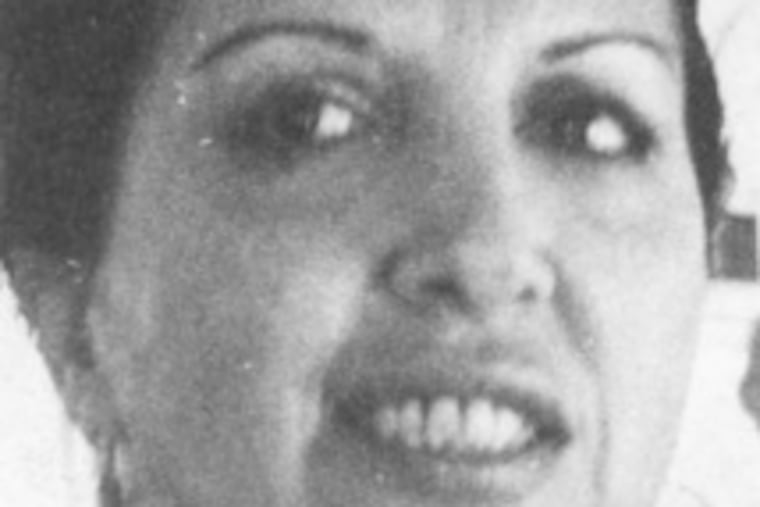
Philadelphia Common Pleas Court Judge Lisa Aversa Richette, 79, an advocate of society's disadvantaged who was as comfortable stirring a pot of soup as political controversy, died of lung cancer Friday.
In a long and colorful career, Judge Richette was a ground-breaking role model who ascended to the bench at a time when female judges were rare. In her 36 years as as judge, she was known for her compassion for those she saw as society's victims, be they neglected children, battered women, or men who had suffered troubled boyhoods. That same compassion, however, often made her a lightning rod for controversy.
"As a judge, she had a wide discretionary handle on her cases. She tried to reform defendants and help them," Philadelphia District Attorney Lynne M. Abraham said yesterday. "Sometimes you could not get her to put Jack the Ripper in jail. She wanted to save that person. Lisa just did her own thing and did not care what others thought."
Judge Richette did not care whether you agreed with her on the bench, she said.
"The operative word for Lisa is extravagant," Abraham said. "She marched to the tune of her own drum."
Judge Richette devoted much of her life to helping abused and neglected children and the mentally ill. Her interest in troubled young people could be traced to her time as a law student at Yale University, when she served as cottage parent at an institution for emotionally disturbed children. Judge Richette herself survived a public battle with depression.
Born in 1928, Judge Richette grew up in South Philadelphia. She recalled years later that as a young girl during the Depression, she watched an endless stream of down-and-out people come to her father's real estate office for help. That experience drove her later devotion to helping the homeless, Judge Richette said in a 1984 interview.
A graduate of Philadelphia High School for Girls, she earned a scholarship to the University of Pennsylvania. She graduated in 1949. In 1952, she was among the first women to graduate from Yale Law School, with honors.
She taught law at Yale and later at Villanova, Temple and St. Joseph's Universities.
In 1954, she returned to Philadelphia and became an assistant district attorney under District Attorney Richardson Dilworth. She was part of cadre of young, energetic prosecutors Dilworth brought into the office.
In 1958, she married lawyer Lawrence Jarvis Richette. It was her second marriage. She had been briefly married to Irving Sandler, an art critic.
She and her second husband had a son, Laurence.
The couple were great entertainers who threw lavish dinner parties in their Lombard Street home amid rich Italian furnishings. Judge Richette was renowned for her cooking.
The marriage ended in divorce. Lawrence Richette demanded that she stop using his name. But his ex-wife, by then a judge, won the fight to retain his name after she married Vero Ajello, a marketing executive.
Judge Richette briefly opened a Center City law practice and in 1969 wrote a ground-breaking book about children and crime, The Throwaway Children, which is still used in classrooms.
"I met her as an adversary in the 1960s when she was an assistant district attorney," said David N. Savitt, a retired Common Pleas judge and a longtime friend of Judge Richette's. "It was obvious that she really cared about these juvenile cases. She cared about them as human beings."
In 1971, Gov. Milton Shapp named her one of the first women to Common Pleas Court, where she earned a reputation as a vocal opponent of the death penalty and a dependable advocate for women, children and the homeless.
"Many lawyers would waive a jury trial and let homicide cases be decided by her because she was competent and fair," Savitt said. "Lisa had her own style. She had deep concern for others."
She earned her share of critics, most notably former Mayor Frank Rizzo, who labeled her "Let 'em Loose Lisa."
Although Judge Richette lost a bid for the state Supreme Court in 1977, city voters repeatedly chose to retain her on the Common Pleas Court bench. At the time of her death, she was a senior judge in Family Court.
In the late 1970s, Judge Richette sought help for clinical depression at the Phipps Psychiatric Clinic at Baltimore's Johns Hopkins Hospital. She did not hide the illness but encouraged others with similar problems to get help.
A devout Catholic, Judge Richette volunteered in the kitchen of the Center City hospice run by the Sisters of Mercy. In her haute couture and bejeweled hands with painted nails, she prepared and delivered food to the homeless.
"When I met Judge Richette more than 20 years ago, I knew I had met a 24-carat character," said Thomas Massaro, a friend and construction project management consultant for the House of Umoja Boystown, a West Philadelphia home for young people operated by Queen Mother Falaka Fattah.
"Many times Lisa said a defendant had appeared in her court and instead of sending him to jail, she wanted him to work with me. She was beyond empathic. If she were a car, there would be no reverse gear."
One of her greatest challenges was her troubled son. In August, Judge Richette's son was charged with seriously assaulting his mother and exposing himself to a TV reporter a day later.
Judge Richette, who spent her final days at Vitas Hospice at St. Agnes Continuing Care Center in South Philadelphia, has no survivors besides her son.
Friends may visit at 6 p.m. Thursday at the chapel at the Cathedral Basilica of SS. Peter and Paul, 18th Street and the Benjamin Franklin Parkway. A Funeral Mass will be said at 10 a.m. Friday at the cathedral. Burial will be in SS. Peter and Paul Cemetery, Sproul and Crum Creek Roads, Marple Township.